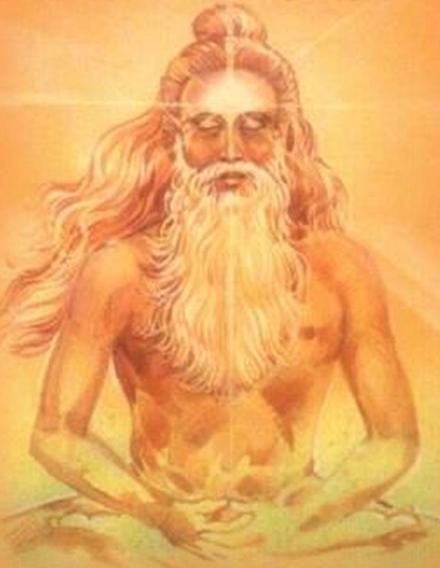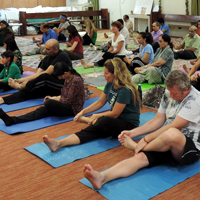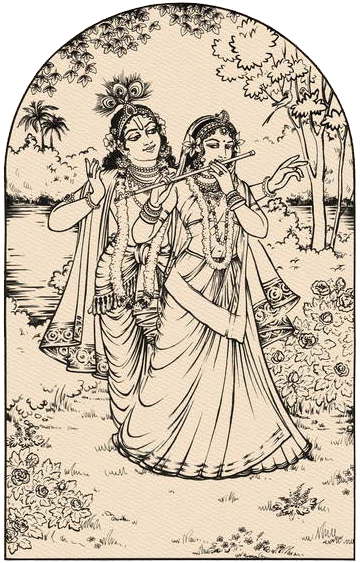|
|
rajas tamaśh chābhibhooya sattvaṁ bhavati bhārata
rajaḥ sattvaṁ tamaśh chaiva tamaḥ sattvaṁ rajas tathā
Sometimes goodness ( sattva) prevails over passion ( rajas) and ignorance ( tamas), O scion of Bharat. Sometimes passion ( rajas) dominates goodness ( sattva) and ignorance ( tamas), and at other times ignorance ( tamas) overcomes goodness ( sattva) and passion ( rajas). Bhagavad Gita 14:10
|
|
|
 |
|
|
 This month's newsletter presents various features that revolve around the theme of Overcoming Afflictions with Seva of God and Guru. We start the section with a brief description how we get caught in the cycle of kleshas or afflictions (Bhakti Ras) and how seva or service can in the truest form can help us to overcome afflictions (Inspirations for Living).
Given that we live in a world overcome by maya, it is not unusual to
forget from time to time, who w e are or what the real purpose of
our life is. The story for Bal-Mukunds about how a
poet experiences a writer's block but finds his muse when visualizing
the image of Radha-Krishna, teaches us that even when overcome by
kleshas, just reflecting on God can show us the correct path. We
then share a recipe for lauki juice to overcome the physical afflictions of the body in the Wellness for Life
column. Finally, we share with you the various types of community
events which will provide you with the opportunity to uplift yourself
and others.
|
 |
Bhakti Ras
Overcoming Kleshas or Afflictions
 We live in a materialistic world and are required to constantly combat
maya, the illusionary feeling that makes us act in ways to seek
happiness for oneself. Such self-serving actions, according to
Maharishi Patanjali, can create various types of kleshas or afflictions like ignorance (avidya), false pride (asmita), attachment (raga), aversion (dvesa), fear of death (abhinivesah), and miseries (kleshas).
We live in a materialistic world and are required to constantly combat
maya, the illusionary feeling that makes us act in ways to seek
happiness for oneself. Such self-serving actions, according to
Maharishi Patanjali, can create various types of kleshas or afflictions like ignorance (avidya), false pride (asmita), attachment (raga), aversion (dvesa), fear of death (abhinivesah), and miseries (kleshas).
It is ignorance that breeds all other types of kleshas
so to overcome these afflictions, we must get rid of ignorance.
It is ignorance to think of impermanent as permanent, impure as pure,
suffering as happiness, and non-self as self. This body is
impermanent yet we do things to please the sensory desires of the
physical body while the soul becomes parched. This state is called avidya or ignorance. Ignorance also causes false pride or asmita
because we believe that we are responsible for our
accomplishments. The achievements are the result of actions
performed by the physical body. This belief leads to false pride, a
defect of the intellect. The pleasure experienced from
achievements and its rewards, encourages us to contemplate on these
repeatedly, leading to attachment to the outcomes or raga. Such attachment to one's physical identity and bodily pleasures also causes fear of both, death, and misery.
If
we nurture the soul, which is permanent, we will achieve the state of
intellectual awareness. This will allow us to recognize that
everything we have, material and spiritual, is a gift from God, which in
turn will teach us to be humble. Humility tends to keep us
grounded in that we perform the actions to fulfill our duties and
obligations but are detached from the outcome. If we train the
mind to think that attachment to God will result in purifying the soul,
we will become attached to the idea of nurturing the soul.
Maharishi Patanjali suggests that meditation can helps us to control the vagrant mind and overcome the kleshas. Through daily sadhana and seva of God and Guru, we will learn to practice compassion, forgiveness and humility.
|
 |
 |
Inspirations for Living
The Importance of Seva or Service

One way to help overcome the various types of mental afflictions is
through sincere seva or selfless service. While many religions
espouse the value of seva, according to the Vedic scriptures, seva to
mankind is akin to seva to God. Swami Mukundananda ji says that
everything we own is a gift from God. We have nothing that is ours
to give to God other than our love. An expression of love for God
is through seva. What is seva? Our scriptures as well as
history provide many examples of saints and revered souls who made it
their life's goal to serve mankind and receive the grace of God.
Who is not familiar with Mahatma Gandhi, the father of the nation of
India and Mother Teresa? For both of these souls, seva was a way
of life. Their service to the poor, oppressed, and disenfranchised
was their life mission with no expectation of rewards or
recognition. The only motivation was to sacrifice oneself for the
benefit of others. To quote Gandhiji, "The best way to find
yourself is to lose yourself in the service of others." Performing
seva can be a very spiritually uplifting experience if it is truly
selfless. There are many forms of seva, the simplest ones for
example are, doing something for family members or friends because it
makes them happy; picking up trash in a neighborhood to clean one's
community; volunteering in a soup kitchen; passing on one's gently used
clothes and things to those who need them more; or even fund-raising for
a noble cause. However, there are also higher forms of seva like
service to the soul. When we perform sadhana to cleanse
our soul, the humility, the expression of gratitude to God elevates a
person. It is this state of mind that makes one more amenable
toward serving others. Similarly, any service for the pleasure of
God is a higher form of seva because it is done for his pleasure. As noted in the Bhagavad Gita (17.20): दातव्यमिति यद्दानं दीयतेऽनुपकारिणे |
देशे काले च पात्रे च तद्दानं सात्विकं स्मृतम् || 20||
dātavyam iti yad dānaṁ dīyate 'nupakāriṇe
deśhe kāle cha pātre cha tad dānaṁ sāttvikaṁ smṛitam
In
other words, when service is delivered to those who are worthy, at the
right time and place, for no other reason than it is the right thing to
do, and with no expectation of receiving anything in return, then the
seva is considered to be an act of goodness. A question that
arises is, "how can we perform in a manner that will please God?"
The best way to serve God is by performing seva suggested by the
Guru. The seva should be one that is desired by the Guru only,
then it will result in grace from Guru and God.
|
 |
 |
Bal-Mukund: Playground for Vedic Wisdom A Writer's Block: Blessing in Disguise Once
upon a time there was a king who was well known for his patronage for
artists and poets. But his patronage was for his own pleasure
through enjoyment of the arts and pride in supporting the poor
artists. The king was particularly fond of his court poet Gopiraj,
whose creative expressions had delighted patrons and the common
people. However, one time, Gopiraj developed a writer's block and
was having trouble creating new poetry. Each time he started to
write, wayward thoughts disrupted his flow and he would crumple the
paper and give up. He had not written any new poems in a very long
time. So one day the king told Gopiraj that if he did not produce
new poems soon, he would be replaced with another more creative
poet. The poet asked the king to give him some time to go to the
forest to find his muse and return with a beautiful poem, inspired by
the beauty of the forest.
 Around the same time, a thief who had insidiously infiltrated the
king's palace, was running towards the forest to hide after having
stolen a bag of gold coins and jewels. When the king discovered
that the missing jewels were the ones that had adorned the statues of
Radha-Krishna in the palace, he made a proclamation that whoever caught
the thief and returned the jewels would be suitably rewarded. The
king's security officers and many others were furiously looking for the
trail that would lead to the thief. Fearful for his life, the
thief thought that it would be best to bury the bag of gold coins and
jewels in the forest which he could retrieve later.
Around the same time, a thief who had insidiously infiltrated the
king's palace, was running towards the forest to hide after having
stolen a bag of gold coins and jewels. When the king discovered
that the missing jewels were the ones that had adorned the statues of
Radha-Krishna in the palace, he made a proclamation that whoever caught
the thief and returned the jewels would be suitably rewarded. The
king's security officers and many others were furiously looking for the
trail that would lead to the thief. Fearful for his life, the
thief thought that it would be best to bury the bag of gold coins and
jewels in the forest which he could retrieve later.
The
thief started to dig a huge burrow so he could bury the bag of
riches. A few yards away, Gopiraj was sitting under a tree trying
hard to create a poem. He saw a woodpecker on a tree pecking in a
rhythm. The digging and pecking were like music to Gopiraj's
ears. His mind started to frame the words, "tuk-tuk, tak-tak khodutt hai"
(the bird's digging sounds like tuk, tuk, tak, tak). The
woodpecker and the thief both heard the poet recite the line. The
woodpecker extended his neck to carefully listen to the human
sound. Gopiraj saw the bird with its stretched neck and uttered
loudly "lambi doké jowat hai" (the bird watches intently with its stretched neck).
The woodpecker reacted to the poet's voice and sat very still as did the thief. Gopiraj saw the bird and recited, "kukkad-mukkad baithat hai"
(the bird sits all coiled up). The woodpecker heard this and flew
away. Coincidently, the thief also decided to run and just then
the poet made up another line, "jhat-put jhat-put daudat hai"
(the bird got away quickly). The thief too heard the line and was
certain that the poet's words were referring to him. So he went
back to the poet with his bag of riches and confessed to Gopiraj that he
had stolen the gold coins and jewels from the king's palace. He
swore to return the treasure and begged the poet to let him go
free.
Gopiraj agreed and came up with a new plan. He
took the bag from the thief and started walking toward the king's
palace. He was visualizing the beauty of Radha-Krishna decked in
the jewels. Poetry about Radha-Krishna's beauty started flowing
from his mouth and by the time he reached the palace, his inspiration
had returned and the poetry complete. Gopiraj was singing the
praises of Radha-Krishna, their beauty and their mercy as he returned
the bag of jewels and gold coins to the king. The king was so
delighted, he asked Gopiraj to adorn Radha-Krishna with the jewels as a
reward and also took him back as his court poet. Thus, the
writer's block was a blessing in disguise and the poetry emerged like
magic as soon as his mind was focused on Radha-Krishna.
|
 |
 |
|
Community Events 2016
|
Little Hands Big Hearts - Radha Krishna Temple Supports
Homeless Children

The
Youth affiliated with the Radha Krishna Temple of Dallas exemplified
the virtues of seva through service at the Hope Supply Company in Dallas
which serves homeless children throughout the DFW area. They
attended an enlightening presentation, participated in an informative
session of questions-and-answers, and worked on several hands-on
projects in preparing items to go out for distribution to various local
agencies providing aid to homeless children. We are very proud of
these children, youth, and some of their parents for their caring and
compassionate gesture and for representing the Radha Krishna Temple of
Dallas through a productive morning in community service.
 
|
|
 |
 |
Upcoming Community Events 2016
The
Radha Krishna Temple of Dallas is very proud to announce several very
interesting upcoming programs. Please mark your calendars and save
these dates.For the benefit of the community, The Radha Krishna temple
provides abundant opportunities to volunteer and participate in various
events.
Holi Ke Rang Radha Krishna Ke Sang
 Vasant
(spring season) is fast approaching, and the breathtaking and
exhilarating early spring blooms of North Texas will soon burst
forth. Spring, the ṛitu rāja (the king of seasons) is an
illustration of God's magnificence. Holi is the very first
festival that gives us an opportunity to celebrate His opulence and the
advent of spring. At the Radha Krishna Temple of Dallas, we are
ushering in spring with soft flower petals, rich cultural programs,
Swami Mukundananda ji's lecture, and Braj-style kirtans on March 27, 2016. Please come join us for this lovely and divine experience.
For more details and to RSVP for this free community event, go to: http://radhakrishnatemple.net/events/holi-radha-krishna-2016/
|
Other Ongoing Community Events
For
the benefit of the community, The Radha Krishna temple provides
abundant opportunities to volunteer and participate in various events.
|
 |
|
Weekly Satsangs
These
satsangs truly propel one in the ocean of bhakti through a combination
of prayer, singing bhajans/kirtans, viewing a video lecture, and
followed by arati, and Prasad.
For local satsang information visit:
www.radhakrishnatemple.net or [email protected].
|
|
|
|  |
|
Bhagavad Gita
Study Group
|
Free Community
Yoga Classes
|
Vishnu Sahashra
Naam Chanting
At: 4020 Sendero Trail
Plano, TX 75024
On: 1st Sat, 3 to 4 PM
Details & Registration
|
|
|
 |

'Dollar A Day' - Pledge Continuous Support!
Donate a Dollar a Day towards the building and upkeep of the Radha Krishna temple! By donating just $1 everyday,
you'll help this noble cause!
How many of us have the opportunity and are fortunate enough to build a house for God?
Set up monthly contributions through credit card/debit card by calling: 860-605-3685 or by visiting temple website at Radha Krishna Temple of Dallas (click).
|
|
 |
 |
Wellness for Life
Lauki (Bottle Gourd) Juice for Overcoming Physical Afflictions
In India, bottle gourd, a common vegetable is referred to as lauki or doodhi.
In the Indian culture bottle gourd is known for its medicinal qualities
and incorporated in the diet for prevention and remediation. The
vegetable is rich source of phosphorous, fiber, potassium, iron, sodium,
and vitamins. Additionally, it has zero calories, fat or
cholesterol which is why it is recommended to people with heart health
issues. Here is a recipe for lauki juice.  Ingredients: Ingredients:- One fresh bottle gourd washed in cold water
- Tulsi (Holi basil) leaves (7)
- Mint leaves (5)
- Pure drinking water
Method of Preparation: - Take the washed bottle gourd without peeling the skin;
- Cut lengthwise in quarter pieces and these into halves;
- If you have a juice extractor, insert the lauki pieces lengthwise;
- Add the tulsi and mint leaves;
- Turn on the switch and extract the juice (approximately 4 ounces);
- Add the same quantity of water as the juice;
- Throw in some crushed pepper and rock salt to taste and enjoy a nice cool drink!
Uses:- Drink
once a day for daily health and prevention but drink it thrice a day -
after at least half an hour of food for remedial purposes.
|
 |
Please provide us with your feedback and requests for the type of features you would like to read at [email protected]
We really want to hear from you.
|
|
|
|
Copyright © Jagadguru Kripaluji Yog 2016. All rights reserved. |
|
|
|